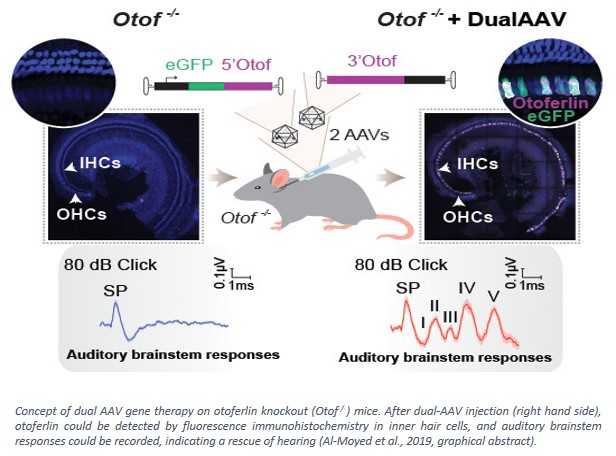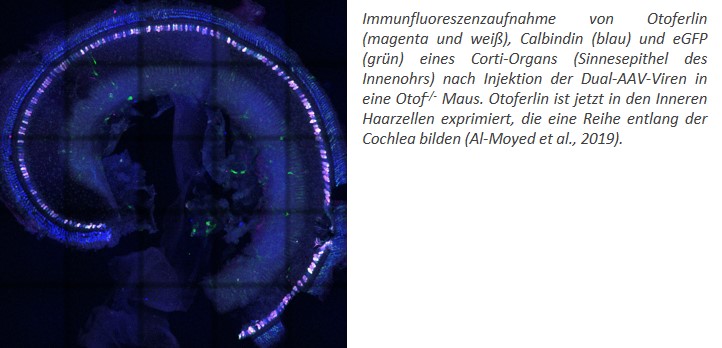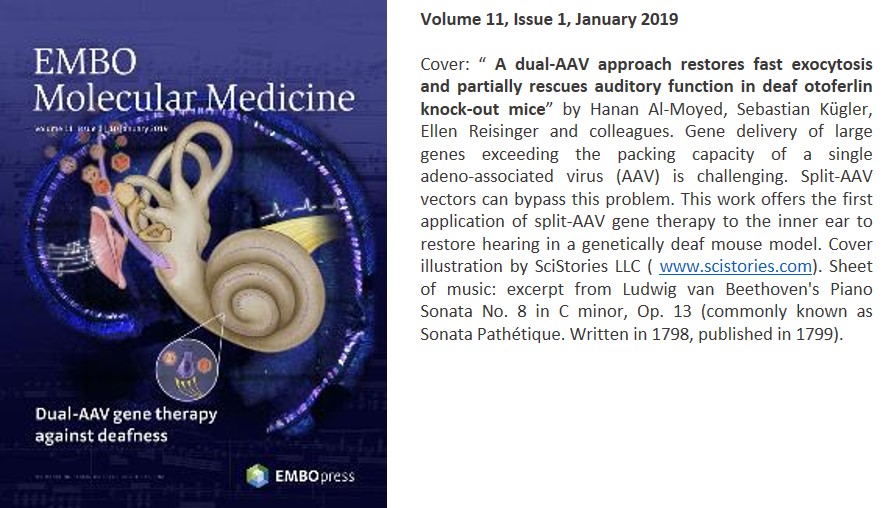Table of Contents
Gene Therapy and Basic Research in the Inner Ear
The Reisinger group is currently working on the further development of a gene therapy for deafness caused by mutations in the OTOF gene. In further basic science projects, we create the conditions for the development of further gene therapies. Our goal is to better understand the function of the inner ear, to characterize new deafness genes, and to use newly developed gene therapies to offer as many affected people as possible a causal and less invasive treatment option.
Senior Investigator: Prof. Dr. rer. nat. Ellen Reisinger

Department of Otolaryngology, Head and Neck Surgery
Tübingen Hearing Research Centre
Elfriede-Aulhorn-Strasse 5
D-72076 Tübingen
Germany
Phone: +49 (0)7071 - 29 88184
Fax: +49 (0)7071 - 29 4950
Ellen.Reisinger@uni-tuebingen.de
Follow us on twitter @LabReisinger
Areas of research
- Development of gene therapy for restoration of hearing with adeno-associated viruses
- Basic research to better understand causes and pathogenicity of deafness and progressive hearing impairment
- Regulation of otoferlin by kinases and the impact on synaptic transmission
Expertise
- Transduction of inner ear cells with adeno-associated viruses
- Molecular biology (e.g. cloning, real-time PCR, single cell PCR)
- Design of dual-AAV vectors for large coding sequences
- Cell physiology of inner hair cells (the sensory cells of the inner ear)
- Mouse genetics (Knock-out, knock-In, CRISPR/Cas9 modification of mice)
- Analyses of the synaptic function of inner hair cells by patch clamp
- Immunohistochemistry and confocal fluorescence microscopy

Research
About 0.1% of the population in developed countries are born deaf, which is about 83.000 people in Germany (Deutscher Gehörlosen-Bund e.V.). Including those with hearing impairment and age related hearing loss, about 15 million people in Germany are affected, and more than 400 million worldwide. Hearing loss can be acquired or innate. Many different forms of hearing impairment are known which are inherited, being caused by mutations in one of about 150 different genes known to date. Presumably several hundred more deafness genes will be identified in near future, e.g. by whole genome sequencing . People with mild or moderate hearing loss can be helped with hearing aids. In case of a more severe hearing loss, especially if affected people cannot understand speech in everyday life even with hearing aids, cochlear implants are currently the only treatment option. These prostheses can serve to understand speech, such that children can acquire language and visit normal schools. In about 10% of the cases, people with cochlear implants still cannot understand speech. Several research groups of the department study these cases to better understand the causes, aiming to improve the method.
The Reisinger group develops gene therapies for certain forms of hearing impairment. Such a causal therapy would save affected people from an elaborate surgery and from wearing the device. Moreover, people receiving a gene therapy would benefit from a more natural hearing than cochlear implant users, enabling them to better discriminate frequencies, which is a prerequisite to recognize emotions and increases the joy of listening to music. Such a gene therapy requires all cells and cell types of the inner ear to be in place at birth. This is the case for only few forms of deafness, since most products of deafness genes are required during embryonal development of the inner ear.
The Reisinger group aims to refine a gene therapy strategy for DFNB9, the form of deafness caused by mutations in the gene OTOF. This gene encodes the protein otoferlin, which is 1997 amino acids in length. Otoferlin is strongly expressed in inner hair cells, which are the auditory sensory cells in the inner ear. Because DFNB9 is a recessive form of hearing loss, both alleles need to be affected for the hearing loss to show up. With few exceptions, mutations in OTOF lead to prelingual profound hearing loss, but some mutations with moderate or progressive hearing impairment are also known. People with the p.Ile515Thr mutation can perceive sounds even at low sound pressure levels, but their speech comprehension, especially in background noise, is rather poor. Studying a mouse model with this mutation, we found that synaptic transmission from inner hair cells is quickly exhausting, explaining also why people affected by this mutation are not benefiting from hearing aids (Strenzke et al., 2016). More intriguingly, some of the mutations cause a temperature sensitive hearing impairment, such that people have almost normal hearing thresholds at normal body temperature but become profoundly deaf at slightly elevated body temperature, from 38.1°C on (Varga et al., 2006). Gene therapy is a causal therapy, by which the missing genetic information of a protein is transmitted to the cells in which this protein is required and normally expressed. Within the cell, the nucleic acids are transported to the nucleus, where they persist and serve to build the correct protein.


In a proof of concept study we showed that two adeno-associated viruses, each transporting one half of the otoferlin coding sequence, restored hearing in a mouse model for DFNB9 (Al-Moyed et al., 2019). The viruses transduced the inner hair cells, where the virus genomes assembled and produced full-length otoferlin mRNA and protein. Hearing was recovered with thresholds of about 50dB, however ABR amplitudes stayed behind wild-type hearing levels. We now aim to improve this dual-AAV strategy to increase both the number of transduced cells and the otoferlin protein levels within the inner hair cells. Our experimental studies contribute to start clinical trials for gene therapy for DFNB9, which are expected to begin in the coming years .

Furthermore, we continue to do basic research, aiming to better understand the inner ear function and to identify novel deafness causing genes. This is the basis to develop gene therapy strategies for more forms of deafness, which will hopefully serve to offer a causal and least invasive therapy for more people affected by hearing loss.
Publications
Team
| André Deutschmann | Franziska Becker | Xanthoula Smyrnakou-Biedenbänder |
 |  |  |
| Dr. rer. nat. Cell Biology | M. Sc. Biochemistry | M. Sc. Molecular Biotechnology |
| andre.deutschmann@uni-tuebingen.de | franziska.becker@uni-tuebingen.de | xanthoula.smyrnakou@uni-tuebingen.de |
| Ramil Arora | Lucie Pifkova | Johanna Ruth Tischlarik |
 |  |  |
| M. Sc. | M. Sc. in Molecular Biology and Genetic | Apothekerin, M.Sc. Pharmaceutical Sciences and Technologies |
| ramil.arora@uni-tuebingen.de | lucie.pifkova@uni-tuebingen.de | johanna-ruth.tischlarik@uni-tuebingen.de |
André Deutschmann
André is working in the Reisinger Lab since June 2020. He is interested in synaptic transmission, post-translational modifications and electrophysiology. In his spare time, he likes to spend time with his family.
Franziska Becker
Franziska is working in the Reisinger Lab since January 2020. She is interested in gene therapy treatment for hearing impairment, tissue clearing techniques and sex differences as well as personalized medicine. In her free time she likes to play basketball.
Xanthoula Smyrnakou-Biedenbänder
Xanthoula is working in the Reisinger Lab since January 2020. She is interested in AAV usage and production for gene therapy treatment as well as mouse model characterization. In her spare time she likes to play Lego with her son and husband.
Ramil Arora
Ramil is working in the Reisinger Lab since October 2022. His project involves investigating intercellular G alpha and related signaling in the injured Cochlea. In his free time one can find him sipping hot chocolate in one hand and redcurrant crumble cake in the other.
Lucie Pifkova
Lucie is working in the Reisinger Lab since September 2023. She is interested in the protein TMPRSS3 and its role in hearing loss. In her free time, she likes to sing or listen to different genres of music.
Johanna Ruth Tischlarik
Johanna is working in the Reisinger Lab since June 2023. Her project involves the proteins GPSM2 and Gαi and she aims to find their binding partners. In her spare time she likes to cook and travel the world.
Follow us
Follow us on twitter @LabReisinger